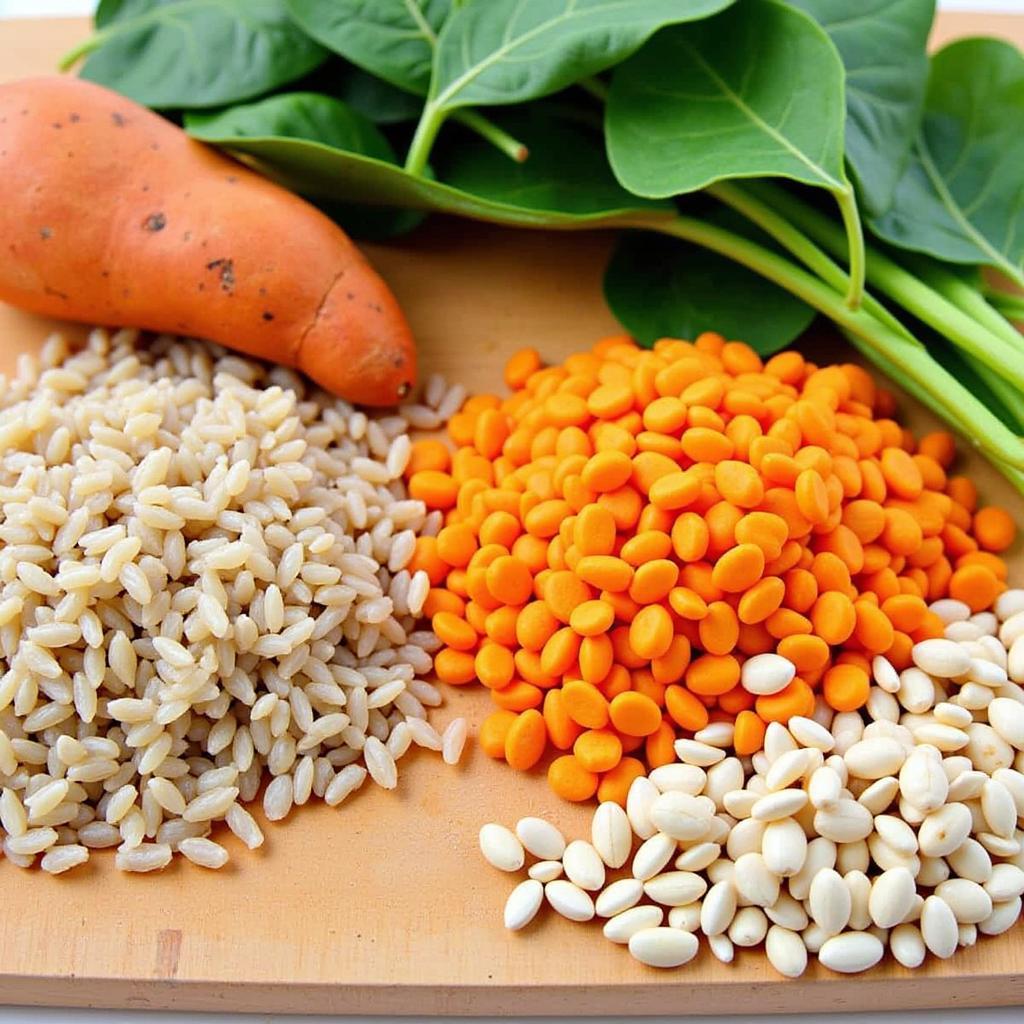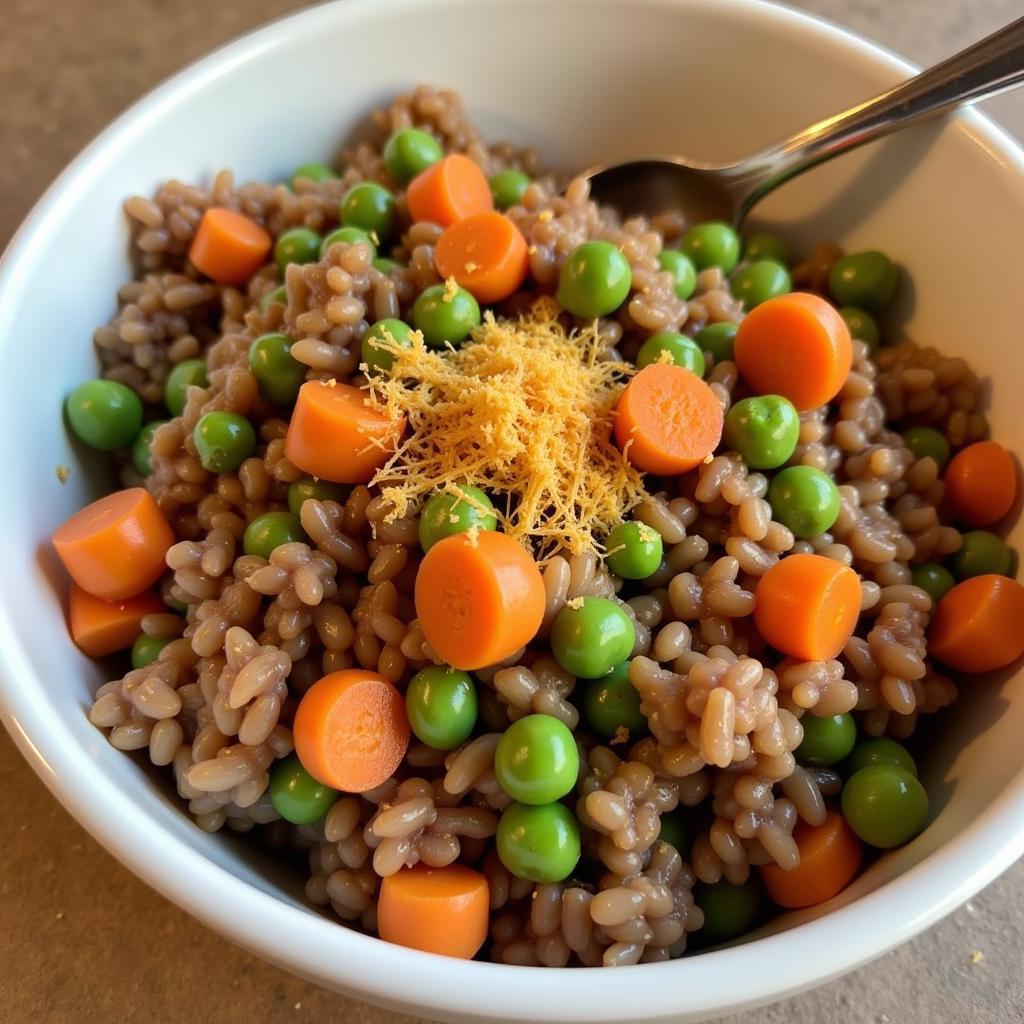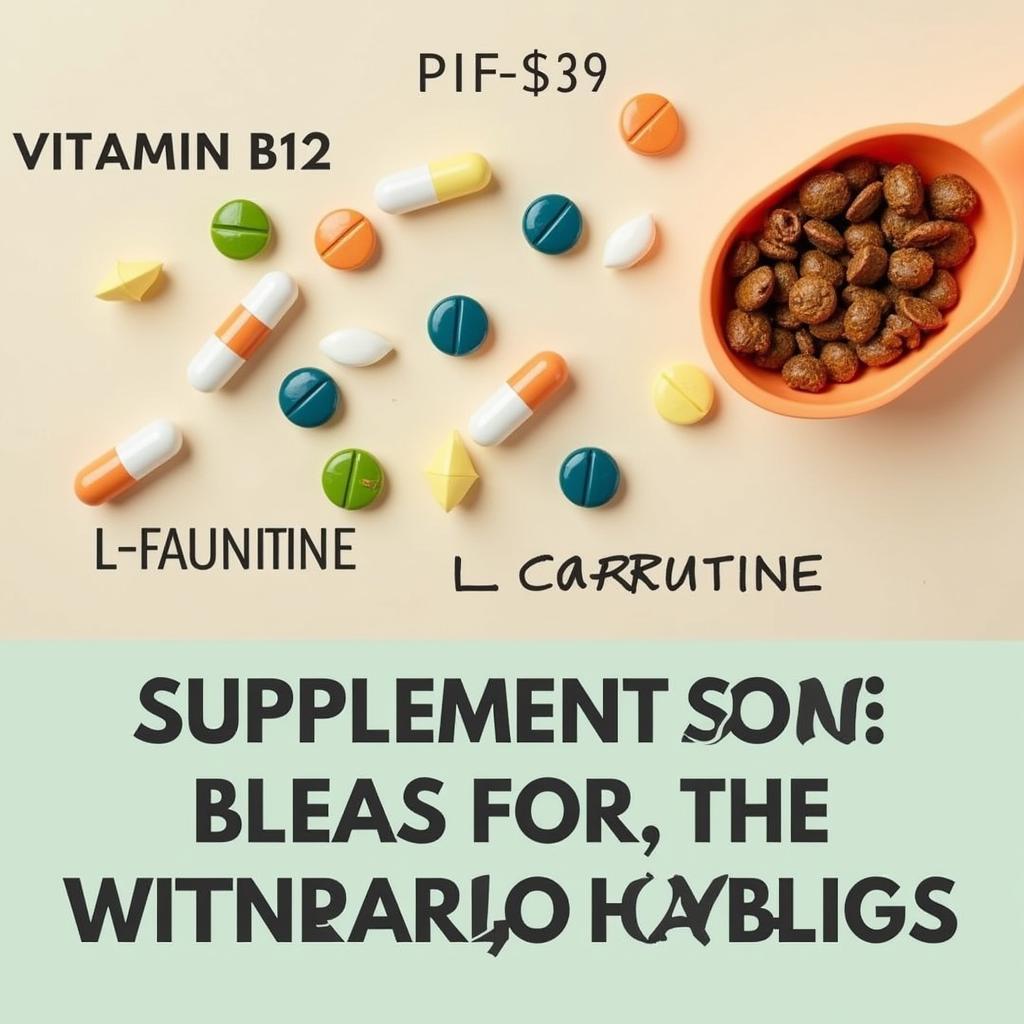Making Homemade Vegetarian Dog Food is a growing trend among pet owners seeking more control over their dog’s diet. Whether driven by ethical concerns, allergies, or a desire for fresher ingredients, creating balanced and nutritious vegetarian meals for your canine companion requires careful planning and understanding. This guide provides you with a comprehensive look at crafting delicious and healthy vegetarian dog food at home.
Understanding the Basics of Vegetarian Dog Food
 Essential Ingredients for Homemade Vegetarian Dog Food
Essential Ingredients for Homemade Vegetarian Dog Food
Switching your dog to a vegetarian diet isn’t as simple as swapping out meat for veggies. Dogs require specific nutrients, regardless of their diet. While dogs are omnivores, meaning they can thrive on both plant and animal-based foods, crafting a complete and balanced vegetarian diet requires careful consideration of protein sources, essential fatty acids, vitamins, and minerals. Key nutrients to focus on include protein, which can be sourced from legumes like lentils and beans, as well as tofu and quinoa. Essential fatty acids, vital for skin and coat health, can be provided through flaxseed oil or chia seeds. Don’t forget about crucial vitamins and minerals like vitamin D, B12, iron, and calcium, often supplemented in commercial vegetarian dog foods.
Creating a Balanced Vegetarian Meal Plan for Your Dog
 Sample Vegetarian Dog Food Recipe
Sample Vegetarian Dog Food Recipe
A balanced vegetarian diet for dogs typically consists of a combination of protein sources, carbohydrates, healthy fats, and essential vitamins and minerals. For example, a meal might include brown rice for carbohydrates, lentils for protein, sweet potatoes for vitamins, and a small amount of flaxseed oil for healthy fats. You could also incorporate dog-friendly fruits and vegetables like carrots, green beans, and blueberries in moderation. Consider checking out this resource on single ingredient food for more ideas. What if you need food for a different pet? We have information on stew cat food as well.
Key Considerations for Homemade Vegetarian Dog Food
When preparing homemade vegetarian dog food, portion control is crucial. Overfeeding can lead to obesity, while underfeeding can result in nutritional deficiencies. Consulting with a veterinary nutritionist is highly recommended to ensure your dog’s specific dietary needs are met. This is especially important for puppies, senior dogs, or dogs with pre-existing health conditions. Dr. Anna Smith, a veterinary nutritionist with over 15 years of experience, emphasizes, “A balanced vegetarian diet can be beneficial for dogs, but it’s crucial to work with a professional to tailor the diet to each individual dog’s needs.”
 Essential Supplements for Vegetarian Dog Food
Essential Supplements for Vegetarian Dog Food
Remember that transitioning your dog to a new diet should be gradual. Start by mixing a small amount of the new food with their current food, gradually increasing the proportion of the new food over several days. This helps prevent digestive upset and allows your dog to adjust to the new flavors and textures. Planning a fun event? Check out our volleyball tournament food table ideas. Looking for a delicious meal for yourself? You might enjoy the Clutch Food Shop in Pentwater. Have you considered using dried egg product in dog food for additional protein?
Ensuring Your Dog’s Nutritional Needs Are Met
It is essential to monitor your dog’s health closely after switching to a homemade vegetarian diet. Regular vet check-ups, including blood work, can help ensure they are receiving adequate nutrition and identify any potential deficiencies early on. “Homemade diets, while offering more control over ingredients, require diligent monitoring to ensure nutritional completeness,” says Dr. Robert Jones, DVM, a specialist in canine nutrition. He further advises, “Regular blood work and consultations with a veterinary nutritionist are essential for maintaining optimal health in dogs on homemade diets.”
Conclusion
Homemade vegetarian dog food can be a healthy and rewarding option for your furry friend, provided it’s carefully planned and balanced. By understanding your dog’s nutritional needs and working with a veterinary nutritionist, you can create delicious and nutritious meals that support their overall well-being. With careful planning and a focus on providing essential nutrients, you can ensure your dog thrives on a homemade vegetarian dog food.
FAQ
- Is a vegetarian diet safe for dogs? Yes, with proper planning and consultation with a vet.
- What are the best protein sources for vegetarian dog food? Legumes, tofu, quinoa, and nutritional yeast.
- What supplements might my dog need? B12, taurine, L-carnitine, and others.
- How do I transition my dog to a vegetarian diet? Gradually, over several days.
- What are signs of nutritional deficiencies in dogs? Changes in coat, energy levels, and digestion.
- Can puppies eat vegetarian dog food? Yes, but it’s crucial to consult a vet for a balanced recipe.
- How often should I consult a vet about my dog’s vegetarian diet? At least annually, or more frequently if necessary.
Common Scenarios and Questions
- Scenario: My dog is losing weight on a vegetarian diet. Solution: Consult your vet to adjust the diet and ensure sufficient calories and nutrients.
- Question: Can I feed my dog commercial vegetarian dog food instead of homemade? Answer: Yes, many high-quality commercial options are available.
Further Reading and Resources
Check out our other articles on pet nutrition for more information on feeding your furry friends. You may also find articles on specific dietary needs and homemade pet food recipes helpful.
Contact Us
For further assistance, please contact us at Phone Number: 02437655121, Email: [email protected] Or visit us at: 3PGH+8R9, ĐT70A, thôn Trung, Bắc Từ Liêm, Hà Nội, Việt Nam. We have a 24/7 customer service team.